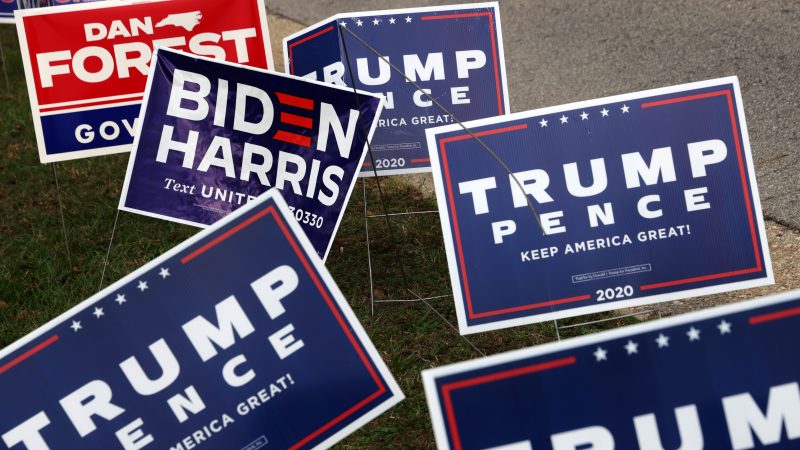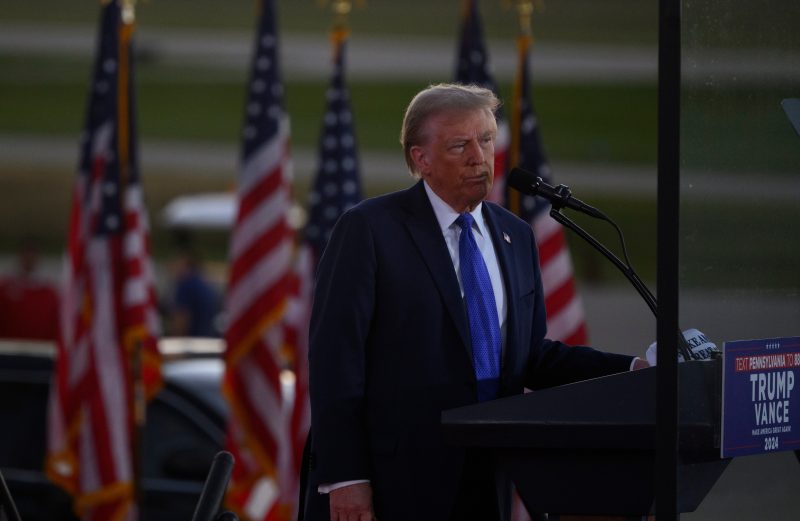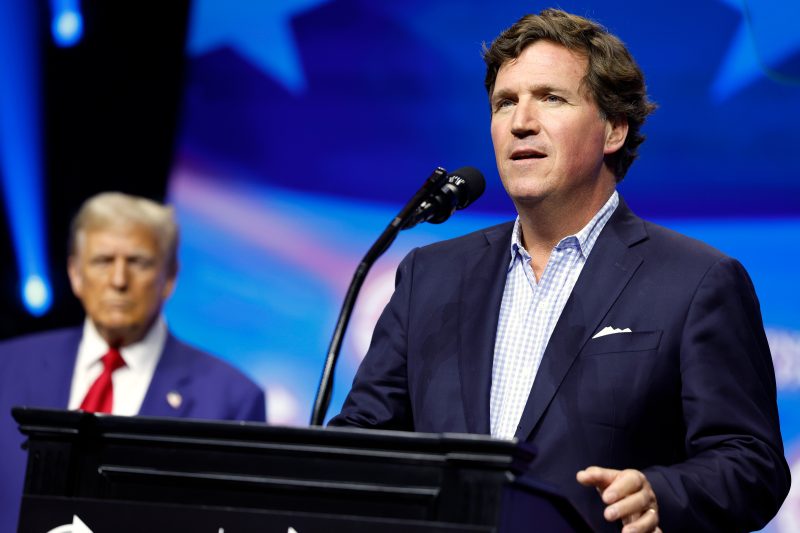
What if November’s likely Biden-Trump rematch suddenly isn’t?
It was on March 31, 1968, that incumbent Lyndon B. Johnson announced that he would not seek renomination as the Democratic Party’s candidate in the November presidential election.
Given the tumult in the country at that point, Johnson said, he had concluded that he would “not permit the Presidency to become involved in the partisan divisions that are developing in this political year.” He did not want to “devote an hour or a day of my time to any personal partisan causes or to any duties other than the awesome duties of this office.” And that was that.
This was the era before the modern nominating process with its 50-state primaries and caucuses and assigned delegates. So something of a free-for-all emerged. Robert F. Kennedy announced that he would seek the nomination, winning the California primary hours before he was assassinated in Los Angeles. Vice President Hubert Humphrey ended up securing the nomination at a deeply divided and tense convention that August.
All of this is to say that while the past half-century has seen relatively calm nominations — thanks in part to the post-1968 implementation of the system we use now — there is no guarantee that pre-election turmoil won’t emerge. In a year where the party front-runners are both historically old and both facing additional pressures, it’s not inconceivable that 2024 might see the nominating contests suddenly upended.
So then what happens?
The presidential election cycle can be broken into three parts. The first part, the one we’re in now, is the period when the major parties have control over their nominees. The last part is the one that unfolds after votes have been cast and the electoral votes have been counted. But particularly in between those phases, things can get murky.
It’s worth noting at the outset that both the Democratic and Republican parties have extensively articulated rules that govern how nominees are selected. You will not be surprised to learn this, both because those rules reduce the likelihood of embarrassing shenanigans (like state party organizations going sideways or candidates trying to upend delegate counts) and because political institutions have a demonstrated affinity for things like Robert’s Rules of Order. The nominating rules, often finalized at the parties’ nominating conventions, indicate how delegates are awarded and how, if needed, candidates might be replaced.
For example, the rules of the Democratic Party indicate that the members of the Democratic National Committee have responsibility for “[f]illing vacancies in the nominations for the office of the President and Vice President” in the event that the nominated candidate is unable or unwilling to appear on the ballot. The Republican rules similarly empower the governing committee in that way; or the party could reconvene — that is, hold another convention.
What’s important to remember here, though, is that these decisions come down to individual people. The parties try to lock down what those people can do as much as possible; delegates won in nominating contests, for example, are generally bound to vote for the candidates their states selected. The same is true of the electors who formally vote for the winner of their states’ general elections; those electors are generally chosen in part because they are understood to be fervently loyal to the candidates they have been chosen to represent. But if a nomination or a nominee should suddenly go sideways, that means that the process can devolve into a scramble for power among those same people.
In their excellent walk-through of a possible vacancy during the selection process, 538’s Oren Oppenheim, Isabella Murray and Geoffrey Skelley explain the points at which those scrambles might emerge. You think that if President Biden gets run over by a truck the day after he’s nominated at the convention, there wouldn’t be a rush among interested Democrats to secure commitments from the 480-plus DNC members who would vote on his replacement?
Or imagine if Donald Trump were to decide the day before the Republican convention — assuming, as seems likely, he has secured a majority of delegates — that he would rather retire to Iowa to farm. All of a sudden, the delegates he had earned are (according to the party rules) up for grabs. An eruption of politicking would ensue.
The party processes themselves are also people-driven, of course. If the Democratic or Republican parties want to change the rules governing the nominating process, they can do so. Would there be outcry? Sure. But a scramble for the nomination under nearly any circumstances would generate an outcry. I mean, there was an outcry at the Democratic convention in 2016 despite Hillary Clinton having effectively locked up the nomination in March — and that wasn’t disrupted by a vacancy.
At some point, states have to finalize their general election ballots, at which point options for the parties are more limited.
In most federal elections, the death of a candidate who is already on the ballot is an oddity but not a particularly challenging one. Mel Carnahan was on the ballot to represent Missouri in the U.S. Senate when he was killed in a plane crash. He got more votes anyway, and his wife was appointed to fill his seat as though he had died after being sworn in.
But, remember, November voters are technically voting not for presidential candidates but slates of electors — individual people who are picked to represent particular candidates. That means that the timing of the vacancy is important.
If Trump were abducted by Alpha Centaurians on Oct. 20, the Republican Party would still be empowered to select a new nominee, someone who could be telegraphed to voters and for whom the electors would be expected to vote. However, if Biden won reelection but was eaten by a shark on Nov. 20, it’s a bit trickier.
See, many states have laws that require electors to submit their electoral votes for the candidate who won the election, a mandate complicated by Trump’s sudden space exploration or Biden’s unfortunate change in living status. The 538 article walks through various ways in which this could be ameliorated — state legislatures changing those rules, for example. But this introduces the real possibility that electoral votes could be fragmented among multiple candidates.
Imagine, for example, that the Biden-Trump vote ends up the same way it did in 2020. Trump gets 202 electoral votes, and Biden gets 306. Then along comes the shark, and Dean Phillips and Marianne Williamson (or whoever) each lock up 153 of Biden’s electors when votes are cast Dec. 17. No candidate has a majority, and, therefore, no candidate is elected president. The House of Representatives gets to pick the president, one vote per state caucus. (As it stands, that means the election of Trump.)
Then there’s the question of what happens if, after winning the general election and having his electors submit their ballots, Trump is — I am running out of pseudo-comedic ideas here — sucked into a black hole before they are counted on Jan. 6, 2025. The National Archives offers an assessment of this possibility, minus the astrophysics.
“We don’t know what would happen if a candidate who, dies after or becomes incapacitated between the meeting of electors and the counting of electoral votes in Congress,” its explainer states. Oh. Okay!
Once the electoral votes are counted, though, we can exhale. If Biden’s majority electoral votes are counted on Jan. 6 and he then gives up a second term on Jan. 10 to start a podcast, the vice president-elect is inaugurated on Jan. 20.
All of this is complicated, and any vacancy or withdrawal, even over the immediate term, would be tricky. The mechanics of all of it are guided by established rules, but those rules involve a lot of independent agency and are themselves malleable should the parties wish. (As election lawyer Benjamin Ginsberg told the AP last year about the Republican Party, “It can always work its will if it wants to one way or another.”)
There is one more lesson to draw from 1968, by the way. After Johnson withdrew, Humphrey advanced to the general election. In November, he was defeated handily by Richard Nixon.



